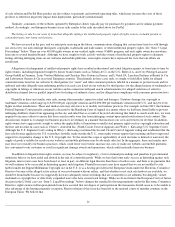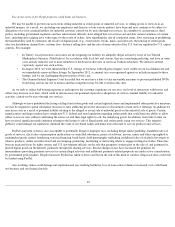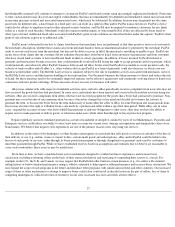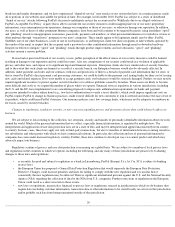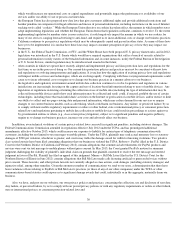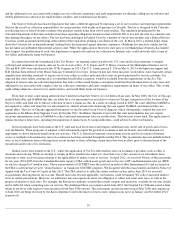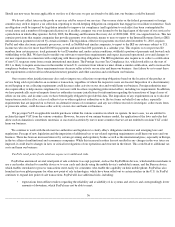eBay 2013 Annual Report Download - page 29
Download and view the complete annual report
Please find page 29 of the 2013 eBay annual report below. You can navigate through the pages in the report by either clicking on the pages listed below, or by using the keyword search tool below to find specific information within the annual report.
knowledgeable criminals will continue to attempt to circumvent PayPal's anti-
fraud systems using increasingly sophisticated methods. From time
to time, such fraudsters may discover and exploit vulnerabilities that may not immediately be identified and remediated, which may in turn result
in one-time increases in fraud and associated transaction losses, which may be substantial. In addition, because users frequently use the same
passwords for different sites, a data breach of a third party site can result in a spike in eBay and/or PayPal transaction losses. PayPal's service
could also be subject to employee fraud or other internal security breaches, and PayPal may be required to reimburse customers for any funds
stolen as a result of such breaches. Merchants could also request reimbursement, or stop using PayPal, if they are affected by buyer fraud or
other types of fraud. Additional fraud risks associated with PayPal's point of sale solutions are described below under the caption “
PayPal's retail
point of sale solutions expose us to additional risks.”
PayPal incurs substantial losses due to claims from buyers that merchants have not performed or that their goods or services do not match
the merchant's description, whether those claims arise from merchant fraud or from an unintentional failure to perform by the merchant. PayPal
seeks to recover such losses from the merchant, but may not be able to recover in full if the merchant is unwilling or unable to pay. PayPal also
incurs losses from claims that the customer did not authorize the purchase, from buyer fraud, from erroneous transmissions and from customers
who have closed bank accounts or have insufficient funds in them to satisfy payments. In addition, if losses incurred by PayPal related to
payment card transactions become excessive, they could potentially result in PayPal losing the right to accept payment cards for payment, which
would materially and adversely affect PayPal's business both on and off eBay. In the event that PayPal was unable to accept payment cards, the
velocity of trade on eBay and off eBay (i.e., other websites that accept PayPal as a form of payment) could also decrease, in which case our
business would further suffer. The Bill Me Later service is similarly subject to the risk of fraudulent activity associated with merchants, users of
the Bill Me Later service and third parties handling its user information. Our Payments business has taken measures to detect and reduce the risk
of fraud, but these measures need to be continually improved and may not be effective against new and continually evolving forms of fraud or in
connection with new product offerings. If these measures do not succeed, our business will suffer.
eBay faces similar risks with respect to fraudulent activities on its websites. eBay periodically receives complaints from users who may not
have received the goods that they had purchased. In some cases, individuals have been arrested and convicted for fraudulent activities using our
websites. eBay also receives complaints from sellers who have not received payment for the goods that a buyer had contracted to purchase. Non-
payment may occur because of miscommunication, because a buyer has changed his or her mind and decided not to honor the contract to
purchase the item, or because the buyer bid on the item maliciously to harm either the seller or eBay. In some European and Asian jurisdictions,
buyers may also have the right to withdraw from a sale made by a professional seller within a specified time period. While eBay can, in some
cases, suspend the accounts of users who fail to fulfill their payment or delivery obligations to other users, eBay does not have the ability to
require users to make payment or deliver goods, or otherwise make users whole other than through its buyer protection program.
Negative publicity and user sentiment generated as a result of fraudulent or deceptive conduct by users of our Marketplaces, Payments and
Enterprise services could reduce our ability to attract new users or retain our current users, damage our reputation and diminish the value of our
brand names. We believe that negative user experiences are one of the primary reasons users stop using our services.
In addition, in the event of the bankruptcy or other business interruption of a merchant that sells goods or services in advance of the date of
their delivery or use (e.g., airline, cruise or concert tickets, custom-made goods and subscriptions), eBay and/or PayPal could be liable to the
buyers of such goods or services, either through its buyer protection program or through chargebacks on payment cards used by customers to
fund their payment through PayPal. While we have established reserves based on assumptions and estimates that we believe are reasonable to
cover such eventualities, these reserves may be insufficient.
From time to time, we have considered more active mechanisms designed to combat bad buyer experiences and increase buyer
satisfaction, including evaluating sellers on the basis of their transaction history and restricting or suspending their activity as a result. For
example, in the U.S., the U.K. and Canada, we may request that PayPal hold seller funds in certain instances (e.g., for sellers with a limited
selling history or below-
standard performance ratings), which is intended to help improve seller performance and increase buyer satisfaction. We
may expand the scope of such programs in the future and introduce other programs with similar aims in these and other countries. Our increased
usage of these or other mechanisms to attempt to improve buyer satisfaction could result in dissatisfaction on the part of sellers, loss of share to
competing marketplaces, reduced selection of inventory on our sites, increased loss rates and other adverse effects.
27






